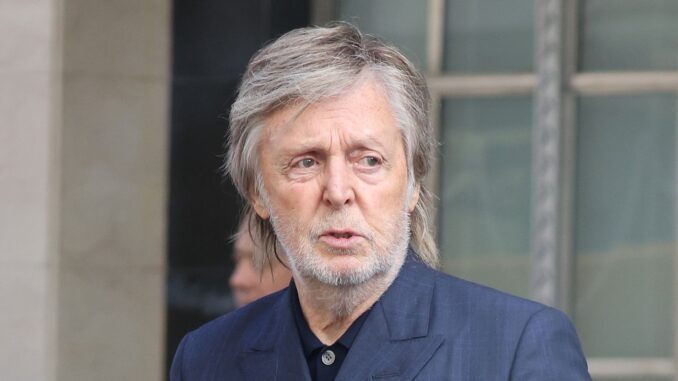
BREAKING: Sir Paul McCartney’s “Disrespectful” Statement About Capitol Records Label Leaves Fans in Stunned Silence
In a world where musical legends are often revered as untouchable, it is rare—almost unthinkable—for a beloved icon to step forward with a controversial, emotionally charged statement that shakes the very foundations of their career. But that is precisely what happened when Sir Paul McCartney, the timeless voice of The Beatles and a pillar of rock and roll history, made headlines this week with an uncharacteristically sharp criticism of his longtime record label, Capitol Records.
The statement, now being widely described as “disrespectful” by industry insiders and fans alike, has ignited a firestorm of reactions—ranging from outrage to heartbreak, and even quiet nods of agreement from those who have long suspected hidden tensions behind the scenes. With his legacy spanning more than six decades, McCartney’s comments have left millions across generations stunned, confused, and eager to uncover the deeper story behind this unexpected rift.
“A Partnership Turned Cold”: The Bombshell Statement
The controversy began during a live interview on The Soundtrack of My Life, a British radio show known for intimate artist retrospectives. Sir Paul, now 83, was candidly reflecting on his storied journey through the music industry—his triumphs, trials, and the ever-evolving landscape of modern music.
But what began as a nostalgic stroll down memory lane suddenly took a dramatic turn.
> “Let’s be honest about it,” McCartney said, leaning into the microphone. “Capitol Records stopped caring a long time ago. To them, it became less about music, and more about money. I don’t feel respected by them anymore—and that’s the truth.”

His words hung in the air like a bombshell, causing even the show’s host, DJ Samantha Evers, to hesitate in response. “Are you saying Capitol Records… disrespected you?” she asked, visibly stunned.
McCartney didn’t flinch.
> “Absolutely,” he replied. “After all the years, all the records sold, all the songs that defined people’s lives… they treat me like an old catalog they can dust off whenever they need to fill a corporate quota. That’s not music. That’s business. And I never got into this for business.
—
Fans React with Shock and Sorrow
Within minutes of the broadcast, social media lit up with reactions from around the globe. Longtime Beatles fans—many of whom have followed McCartney’s solo journey with unwavering devotion—expressed a mix of heartbreak, disappointment, and confusion.
A fan page with over 1.2 million followers, posted:
> “We never thought we’d hear Paul speak this way. It hurts. But maybe it’s been hurting him for a long time. #McCartney #CapitolRecords”
> “I grew up listening to Paul’s music with my dad. Hearing him say Capitol disrespected him—it feels like the end of an era.
> “Sir Paul may be a legend, but calling out Capitol like that? Risky. It’s not just ‘disrespectful’—it’s bad business.
> “When legends speak out, we should listen. Paul McCartney earned the right to speak his truth. Whether we like it or not, it’s probably been brewing for years.
A Long and Complicated History
To fully understand the impact of McCartney’s words, one must dive into the deep and complex relationship between the artist and Capitol Records—a partnership that began in 1963 when Capitol became the official distributor of The Beatles’ music in the United States.
It was Capitol that helped propel the Fab Four into American superstardom, orchestrating the launch of Beatlemania in the U.S. and overseeing some of the most iconic albums in music history: Rubber Soul, Revolver, Sgt. Pepper’s Lonely Hearts Club Band, Abbey Road, and more.
After The Beatles disbanded in 1970, McCartney’s solo work and his band Wings continued to be released under the Capitol label for decades. From Band on the Run to Egypt Station, the label reaped immense profits from McCartney’s enduring relevance and creativity.
But according to insiders, cracks in the relationship began to show as the music industry shifted in the 2000s. With the rise of streaming platforms, changing consumer habits, and the consolidation of major labels under massive corporate umbrellas, artists—particularly veteran musicians—found themselves increasingly sidelined in favor of newer, more commercially trendy acts.
—
The Label’s Response: Cold and Calculated
As public pressure mounted, Capitol Records released a carefully worded statement within 24 hours of McCartney’s remarks:
> “Sir Paul McCartney is a legendary artist with whom we have shared a historic and deeply meaningful partnership. While we are saddened by his recent comments, we remain proud of the work we’ve done together and are committed to honoring his legacy.”
The statement was widely criticized as being vague, dismissive, and corporate in tone.
> “It’s a classic non-response,” music journalist Elaine Rogers said on BBC Music Now. “They don’t address any of Paul’s concerns. They don’t deny disrespect. They just say they’re ‘proud.’ That’s not what this moment calls for.”
Industry Experts Weigh In
Behind the scenes, the music industry has been buzzing with speculation. Was this a calculated move by McCartney to finally break free from a decades-old contract? Or was it a spontaneous outburst from a legend who felt ignored?
Music historian Dr. Malcolm Torres offered insight:
> “Paul McCartney is not impulsive. Every public statement he makes is considered. If he said Capitol disrespected him, he likely has a long list of examples—and he’s fed up. It might also be a sign of a deeper trend: legacy artists fighting for their artistic identity in a world that increasingly commodifies nostalgia.”
Whispers of Betrayal: What Went Wrong?
Though neither McCartney nor Capitol have released further details, several anonymous sources close to the situation have shared alleged reasons for the fallout:
1. Ownership Battles: McCartney has been locked in private legal efforts to regain full control over The Beatles’ U.S. catalog for years. Capitol, owned by Universal Music Group, has resisted giving up control.
2. Marketing Disputes: Recent remasters and box set releases have reportedly been handled without McCartney’s full creative input—something he took as a personal slight.
3. Legacy Neglect: Capitol allegedly prioritized promoting younger artists over McCartney’s newer works, despite their critical acclaim. His 2020 album McCartney III, for example, saw limited support compared to other pop acts.
What This Means for the Future
McCartney’s statement could have wide-reaching consequences—not just for his personal career, but for other legacy artists who feel similarly marginalized by major labels.
Music rights advocate Clarence Jensen believes McCartney’s words are “the start of a movement.”
> “When a figure like Sir Paul McCartney calls out the industry, it emboldens others to do the same. Artists like Springsteen, Elton John, and even the estates of Bowie and Prince have long harbored frustrations. This might be the dam breaking.”
There’s also speculation that McCartney could take his entire catalog independent or partner with a new distribution model—such as Taylor Swift’s path with Republic Records and Universal, where she retained ownership and full creative control.
A Personal Moment, A Public Reckoning
For all the noise, the business angles, and the media frenzy, one thing remains painfully clear: Paul McCartney feels betrayed.
And in that betrayal lies something deeply human—a wound carried by someone who gave the world his heart in the form of music, and now feels it has been discarded by the very system he helped build.
“I don’t want to fight,” McCartney concluded during his interview. “But I won’t be silent anymore.”
—
Final Reflections: A Legend’s Voice, Loud and Clear
In the twilight of his career, Sir Paul McCartney continues to defy expectations—not with a chart-topping hit, but with something perhaps even more powerful: the courage to speak the truth, even when it’s painful.
Whether or not Capitol Records responds in kind, or if any reconciliation is possible, remains to be seen. But one thing is certain: this moment will go down in music history not as a scandal, but as a reckoning—a reminder that respect is not given once, but earned every day.
And as McCartney’s voice reverberates across the world once again, it carries not just the weight of his legacy—but the hopes of every artist who’s ever felt silenced, sidelined, or forgotten.
Leave a Reply